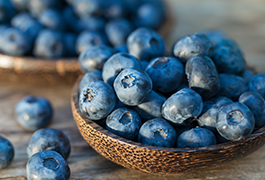
What are they?
With a click of your smart phone or computer, or a leisurely flick through any magazine at your local GP surgery, you can be sure to stumble across a new diet or enthusiastic blogger promising anything from:
- dramatic and rapid weight loss
- beauty benefits
- increased quality of sleep
- soaring energy levels.
So, how can you tell if a diet is healthy and evidence-based, or simply ‘faddy’?
The health and beauty myth
Before we go into more detail, it’s probably helpful to uncover a common ‘health and beauty’ myth: that our bodies need detoxifying’ - this simply isn’t true.
Our bodies are remarkable; due to our liver and kidneys, we are perfectly equipped to detoxify. Our bodies do this by removing waste and toxins like alcohol, medication, bacteria and products of our digestion, without any help.
‘Detox diets’ are a marketing myth, and their reported benefits are not based on sound evidence.
What is a 'fad' diet and what does it suggest?
A ‘faddy’ diet is one where you are advised to do any of the following:
- cut out food groups (dairy and starchy carbs are popular - without there being a medical reason to do this)
- restrict an eating pattern to a few foods
- stick to fruit or vegetable juices
Safe weight loss is 1-2 pounds a week. Yes, you may lose more at the beginning of your diet, but this will be water. More rapid weight loss, the kind promised by many ‘fad diets’, is your body losing water and lean body mass, therefore making it unlikely that you will be able to keep the weight off in the long term.

What's wrong with the advice?
Diets which cut out food groups – and are not replaced with other foods to account for lost nutrients - are very restricted, and will mean your body is not getting the nutrients it needs.
However, you need the right balance of food for long-term health.
Many people think that all carbs are 'bad', and cut them from their diet.
However, all the evidence suggests that wholegrain carbs such as oats, brown rice, wholewheat pasta, fruit and veg are important for good health - especially heart health - and many people's intake is lower than it should be.
Despite this, we do know that evidence indicates that low-carb diets can help people with Type 2 diabetes to lose weight and improve blood glucose control. Since the amount of carbohydrate has the biggest effect on blood glucose levels after eating, many people with diabetes (particularly those with Type 2) need to have some level of carbohydrate restriction.
This does not refer to the wholegrain carbs previously mentioned, but rather foods such as cakes, chocolates, sweets and crisps, which have no nutritional value and should be what we all target first - whether we have diabetes or not.
Are there any other issues?
If you treat your diabetes with insulin, or any other medication that puts you at risk of hypoglycaemia (low blood glucose levels), cutting down on your carbs may increase this risk. However, your diabetes team can support and help you to adjust your medications to reduce your risk of hypos so you can do this safely.
The facts about clean eating
So called ‘clean diets’ are a popular dieting fad at the moment. ‘Clean eating’ is often associated with a healthy lifestyle, and a certain beauty ideal that is often promoted by online bloggers.
The core principles are to eliminate processed food, reduce salt, increase fruit and veg, choose wholegrain carbs and reduce alcohol. However, some ‘clean dieting’ advocates go further than this – some may advocate gluten-free (despite not having a medical diagnosis such as coeliac disease which requires a gluten-free diet), dairy-and soya-free (again, without an apparent clinical reason), or specifying that only raw, or mildly-heated foods should be eaten.
Some also advocate that to have a completely ‘clean’ diet, you need to be vegan.

Is clean eating a good idea?
It’s true - certain aspects of a ‘clean free’ diet can be useful. We know that evidence suggests reducing processed foods, reducing alcohol, increasing our intake of fruit and vegetables and wholegrains has important health benefits for everyone, including people with diabetes.
Yet, the majority of ‘clean eating’ principles are not based on solid evidence, nor are they recommended by people who are qualified to offer advice on nutrition. Anyone can call themselves a ‘nutritionist’, or market themselves as a ‘food expert’.

Is this not sound advice?
Anyone can call themselves a nutritionist, or market themselves as a ‘food expert’. However, only dietitians are uniquely qualified and registered to provide sound dietary advice, backed by the latest evidence. Dietitians are degree-educated and are the only nutrition professionals to be regulated by law.
Additionally, only those registered with the statutory regulator - the Health & Care Professions Council (HCPC) - can use the title of Dietitian/Registered Dietitian.
Something to consider...
Following so-called 'clean eating' could mean that your diet is very unbalanced, especially if you're cutting out many foods or groups and then not replacing the lost nutrients.
Eating disorder experts are also worried that 'clean eating' demonises food, leading to shame and a sense of failure is perceived 'banned foods' are eaten. Evidence has suggested this is indeed a reality.
The Paleo diet
This is a diet we often get asked about. It’s based on the types of food presumed to have been eaten by our Stone Age ancestors - early humans - and consists mainly of meat, fish and vegetables, cutting out dairy, cereal products and processed food. In 2014, the British Dietetic Association ranked it amongst five diets to avoid in 2015.
The diet is not based on sound evidence. We don’t know what our early ancestors ate, and many versions of the Paleo diet, which recommend a high meat intake, go against current dietary advice. Again, cutting out food groups can be detrimental to health unless careful substituents are made.

The Dukan diet
Similarly, this diet which is popular with some celebrities, was criticised by the British Dietetic Association in recent years. It’s nutritionally unbalanced (hence the requirement for a vitamin supplement and oat bran), restrictive, and complicated, including phases of eating only protein and avoiding a number of foods.
Certainly, following a nutritionally unbalanced diet will have long-term health consequences, and cutting down on carbs will need careful management if you take insulin and diabetes medication that can cause hypos.
Our advice for following a diet
Everybody’s needs are different, and there is no ‘diet’ that will suit everyone. The most effective diet is one you can stick to, usually with small but sustainable changes, which incorporates food from every food group.
And, because we are a nation which consumes too many fatty and sugary foods - like cakes, fizzy drinks, chocolate, biscuits and crisps - the Eatwell Guide reminds us to either cut out, or limit! As well as your overall balance of food, look carefully at your portion sizes.
We often hear that people with diabetes have been following a healthy diet, but still find it hard to manage their weight and blood glucose. Many don’t realise, until going back and actually weighing their meals, that their portion sizes of ‘healthy food’ were far too large.
